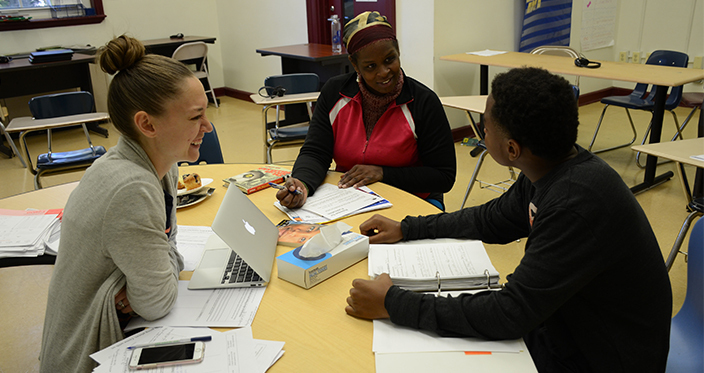
Flamboyan has been on a journey to understand what family engagement looks like in high school. This six part series explores what we’ve learned along the way. Names have been changed to protect identities of participants. Read previous entries: Part I
Monique was feeling frustrated. Her daughter Aaliyah, a high school junior, was struggling with some of her classes and Monique was surprised at the lack of communication from her daughter’s teachers, even when she took the initiative to contact them. “I felt like it was a little disrespectful, especially if I’m personally reaching out about an issue that I felt was important to me,” Monique shared.
Monique was feeling so discouraged that when portfolio presentations—a showcase of student work that parents are invited to attend—came around, she wasn’t planning on attending. That’s when Mr. Brown, Aaliyah’s English teacher, made a crucial phone call.
“Aaliyah was falling behind in his class,” Monique explained. “Mr. Brown communicated with me individually. We had the chance to talk on the phone, which is why he was the only class I went to the portfolio presentations for. Having that conversation with him made me feel comfortable. So that was a trusting relationship. Because I trusted him as a teacher. I felt like we were on the same page.”
Trusting relationships between teachers, students, and families are the foundation of practicing family engagement effectively. These relationships may seem less important as students gain independence in high school, but research shows that building relationships is essential to support students’ post-secondary path. When strong relationships exist between students, teachers and families, students feel a sense of belonging that sets the stage for academic and socioemotional success. The experience of feeling accepted and embraced in their school community leads students to demonstrate greater motivation, have higher expectations of success and believe in the value of academic work. The same seems to be true for students’ families. When they feel welcomed and respected by their children’s educators, as Monique did with Mr. Brown, they feel safe and more willing to engage with the school community.
As we piloted family engagement practices in high schools, we listened to families and educators to understand what it really takes to build trusting relationships. We learned that there were certain ways educators showed up that really deepened their bonds with parents and students.
Building Relationships with Students
- Be consistent – Making themselves available to students and keeping in touch with students’ families yielded opportunities for students to share about their personal lives and build trust.
- Give praise – Praising students for their performance, including recognition for growth or character.
- Give emotional support – Checking in with students regularly, acknowledging how students feel, and supporting them where they are.
- Value students as authentic individuals – Intentionally learning about each student as an individual led to students feeling seen, safe and like they belonged.
Building Relationships with Families
- Show genuine care – Observing educators demonstrating care for their students led to families being more open to communication.
- Get family input – Prioritizing family input on school events made the events more relevant and tailored to the students’ and families’ backgrounds, personalities, and learning styles.
- Remember consistency, collaboration, communication – Communicating and collaborating regularly with families created a community of support for students.
When Mr. Brown reached out to Monique to discuss her daughter’s academic performance, he was demonstrating that Aaliyah’s success in his class was a priority for him. Inviting Monique to the school for portfolio presentations showed that he valued her input and saw her as an asset to Aaliyah’s educational success. Mr. Brown demonstrated belief in Aaliyah’s potential and his willingness to engage Monique led to Aaliyah’s eventual success in his class, despite her previous challenges.
“He communicated with me a lot, to the point where Aaliyah was able to stay at a good grade level in his class,” Monique explained. “He took the time out to get to know Aaliyah individually as a student. He knew her capabilities and he knew that she was a good, bright student who was able to get her work done. That meant a lot to me.”
The lesson here is that even though students are getting older and becoming more independent, relationships still matter. They always will.
Stay tuned for next week’s blog post exploring five essential roles families can play to support their student’s success in high school.

Laurie Ascoli is the former Program Design Associate on our Effective Family Engagement team in our Washington, DC office.